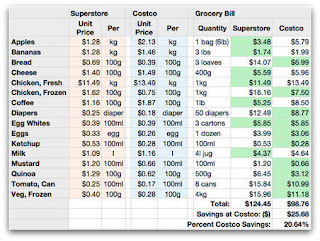 |
According to the U.S. Commerce Department, CORPORATE profits are at their highest
level in at least 85 years. Employee compensation is at the lowest level in 65 years.
What does that suggest?
|
This is today's bottom-line driven, profit-motivated business model. A good bad example - Walmart, perhaps.
The six Walmart heirs took more than $1 Billion each in profits last year.
2014 Walmart sales associates make $8.81 per hour on average. This translates to annual pay of $15,576, based upon Walmart's full-time status of 34 hours per week. That's below the poverty line for a family, of course. (UPDATE: WMT upped their minimum to $9/Hr earlier this year, but it hasn't worked out that well as the change only benefits new hires.)
Costco, by comparison, pays a reasonable wage. Costco's CEO and president, Craig Jelinek, has publicly endorsed raising the federal minimum wage to $10.10 an hour, and he takes that to heart. The company's starting pay is $11.50 per hour, and the average employee wage is $21 per hour, not including overtime.
Prices? Walmart offers no advantage over Costco or Target.
 And how do they treat their community? Working at Walmart means you qualify for for SNAP, EITC, and housing assistance programs. “A single Walmart Supercenter cost area taxpayers between $904,542 and $1.75 million per year," in family assistance costs due to low wages and deliberately restricted hours.
And how do they treat their community? Working at Walmart means you qualify for for SNAP, EITC, and housing assistance programs. “A single Walmart Supercenter cost area taxpayers between $904,542 and $1.75 million per year," in family assistance costs due to low wages and deliberately restricted hours.Walmart stock is as unimpressive as their business practices. Costco and Kroger have beaten WMT performance impressively.
Feel free to comment about it to management. The business still needs to be adjusted.
According to the U.S. Commerce Department, CORPORATE profits are at their highest level in at least 85 years. Employee compensation is at the lowest level in 65 years. What does that suggest?









